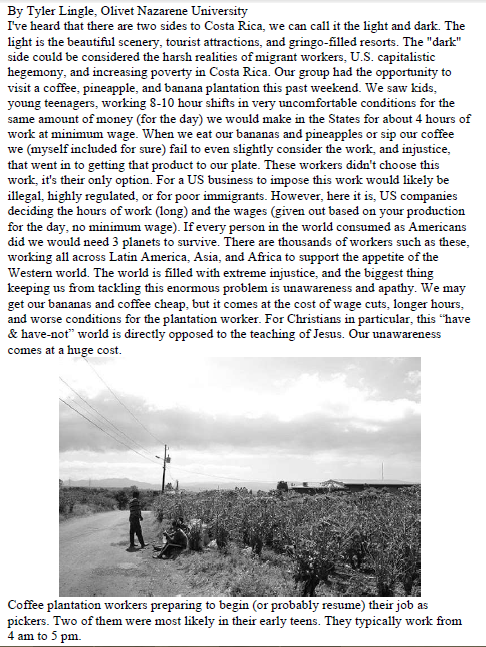This is a blog post shared by Lindsey Broek, from Northwestern University.
Two weeks ago the goodbyes began. I said goodbye to my San Jose family and moved in with my new host family in San Pedro, the place I am calling home for my last couple weeks in Costa Rica. This semester has been such a whirlwind of new things, new experiences, and new people. Sometimes I’ve been in awe and excitement of all of the “new.” Other times I haven’t been quite sure what to think. Still other times I was wishing I could just be at home again in my comfort zone (but then I remember how cold it is in Iowa and that feeling usually goes away). I felt so at home with my family in San Jose and so it was difficult to have to say goodbye, not knowing if it would be goodbye for a year, or goodbye forever. My nephew Matias did say he was going to ride in my suitcase and go back to the US with me, so I should be seeing him again in about a week or so.😉
In my new immersion, I am living with a host family in San Pedro, with a mom, dad, and 9 year old sister, Maria Lucia. They have been so welcoming to me since I arrived, and have treated me as one of their own. I definitely feel like I am never grateful enough for everything they do for me, be it taking time out of their day to show me around town, or just buying me a coke because they know how much I like it. Last week my dad was showing me various English songs on YouTube; he loves to listen to American music from the 60s and 70s, and he wanted to see if I knew the songs (I did know most of them, surprisingly). We also ended up watching almost 2 hours-worth of his favorite singing videos from shows like “America’s Got Talent.” We laughed; we cried; it was a good time. Really though, we laughed, and, well, I didn’t cry but I’m pretty sure my dad started tearing up at one point.
I am also currently volunteering at a children’s shelter, hanging out and playing games with the kids. These kids at this shelter have some of the biggest hearts I’ve ever seen. Some of them I’m sure have been through a lot, and still they are so full of joy and love. Almost every day that I’ve gone I’ve received a gift from one of the kids, something like a bracelet, a picture, or various paintings of trees (that seems to be the popular painting of choice lately). Each day I’m welcomed with smiling hellos and hugs, and when I leave I get frantic goodbyes (there’s a little girl who will run after me, yell “adio!”and blow kisses until I walk out the door). Magic card tricks are super popular with the boys there, and most of them have shown me a card trick, which usually involves quickly shoving cards underneath their legs when they think I’m not looking to show that they “magically” disappeared, or asking me to pick a card and put it on the bottom, so they can “magically” whip out the card from the bottom. It’s good stuff. But this volunteering has been one of my favorite parts of the semester, even if one of the kids thought my name was “Gypsy” last week.🙂 I can truly feel the love of Jesus in that building, and I really, really hope the kids feel that love, and know that they are loved, no matter what their backgrounds may be.
Overall, as I think about how I’m in the last 2 weeks of the semester, I feel mixed emotions. Having to meet a whole new family and start a “new” life again felt a little bit like the beginning of the semester, and so that was frustrating for me, after becoming super comfortable in my San Jose home. I’ve also been preparing for the next semester, figuring out student teaching, graduation info, etc. And just the fact that there’s only two weeks left has made it a tad difficult to fully be here. However, I realize I’m still in Costa Rica. I need to be here, not just physically, but mentally. I have a wonderful host family who wants to get to know me and include me as one of their own. One of the favorite words of Costa Ricans (and has become one of mine) is “tranquila,” which essentially means “relax.” Life doesn’t need to be rushed. I don’t need to worry about things that aren’t happening for a few weeks; I can relax and worry about those things when the time comes. Life is going to move so fast when I go back to the US, so I want to cherish the time I have left here. I’ve got two more weeks to continue making some of the best memories of my life, with some of the coolest people🙂























